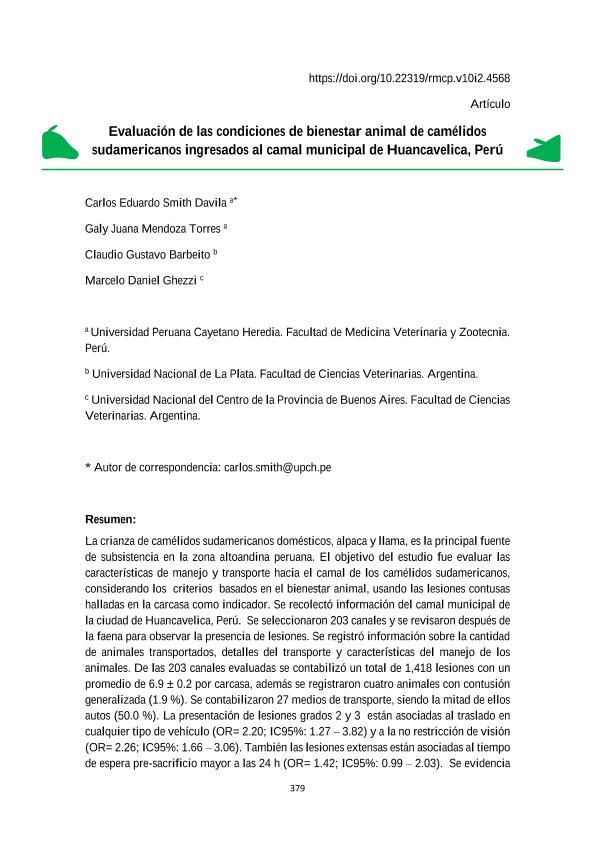Artículo
La crianza de camélidos sudamericanos domésticos, alpaca y llama, es la principal fuente de subsistencia en la zona altoandina peruana. El objetivo del estudio fue evaluar las características de manejo y transporte hacia el camal de los camélidos sudamericanos, considerando los criterios basados en el bienestar animal, usando las lesiones contusas halladas en la carcasa como indicador. Se recolectó información del camal municipal de la ciudad de Huancavelica, Perú. Se seleccionaron 203 canales y se revisaron después de la faena para observar la presencia de lesiones. Se registró información sobre la cantidad de animales transportados, detalles del transporte y características del manejo de los animales. De las 203 canales evaluadas se contabilizó un total de 1,418 lesiones con un promedio de 6.9 ± 0.2 por carcasa, además se registraron cuatro animales con contusión generalizada (1.9 %). Se contabilizaron 27 medios de transporte, siendo la mitad de ellos autos (50.0 %). La presentación de lesiones grados 2 y 3 están asociadas al traslado en cualquier tipo de vehículo (OR= 2.20; IC95%: 1.27 3.82) y a la no restricción de visión (OR= 2.26; IC95%: 1.66 3.06). También las lesiones extensas están asociadas al tiempo de espera pre-sacrificio mayor a las 24 h (OR= 1.42; IC95%: 0.99 2.03). Se evidencia que las malas características de los vehículos, malas condiciones de transporte y manejo, aumentan la probabilidad de encontrar lesiones en las canales. Por lo tanto, no se cumplen con los criterios de bienestar animal durante el manejo y transporte de los camélidos sudamericanos. Raising South American domestic camelids is the main source of subsistence in the Peruvian Andes. Under the understanding that pre-slaughter handling and transport practices can affect meat quality an evaluation was done of South American camelids based on animal welfare criteria and carcass lesions. Data were collected at the Huancavelica municipal slaughterhouse, Peru. A total of 203 carcasses were inspected post-slaughter for lesions from trauma. Information collected on transport included number of animals transported per vehicle, transport characteristics and animal handling practices. Every one of the 203 evaluated carcasses exhibited evidence of pre-slaughter mistreatment. A total of 1,418 lesions were recorded, with an average of 6.9 ± 0.2 per carcass; four animals (1.9 %) exhibited generalized traumas. Of the 27 animal group arrivals, half were in cars (50.0 %). Grade 2 and 3 lesions were associated with transport in any vehicle type (OR= 2.20, 95% CI: 1.27 - 3.82), and no vision restriction (OR= 2.26, 95% CI: 1.66 - 3.06). Large area lesions were associated with pre-slaughter wait times greater than 24 h (OR= 1.42, 95% CI: 0.99 - 2.03). South American camelid transport and handling practices at the studied slaughterhouse were generally poor and clearly compromised carcass quality as evidenced by ubiquitous lesions. Animal welfare criteria and regulations for South American camelids were not fulfilled.
Evaluación de las condiciones de bienestar animal de camélidos sudamericanos ingresados al camal municipal de Huancavelica, Perú
Título:
Evaluation of animal welfare conditions of South American camelids admitted to the Huancavelica municipal slaughterhouse, Peru
Smith Davila, Carlos Eduardo; Mendoza Torres, Galy Juana; Barbeito, Claudio Gustavo ; Ghezzi, Marcelo Daniel
; Ghezzi, Marcelo Daniel
 ; Ghezzi, Marcelo Daniel
; Ghezzi, Marcelo Daniel
Fecha de publicación:
06/2019
Editorial:
Instituto Nacional de Investigaciones Forestales, Agrícolas y Pecuarias
Revista:
Revista Mexicana De Ciencias Pecuarias
ISSN:
2007-1124
e-ISSN:
2448-6698
Idioma:
Español
Tipo de recurso:
Artículo publicado
Clasificación temática:
Resumen
Palabras clave:
ANIMAL WELFARE
,
LESIONS
,
SOUTH AMERICAN CAMELID
,
TRANSPORT
Archivos asociados
Licencia
Identificadores
Colecciones
Articulos(CCT - LA PLATA)
Articulos de CTRO.CIENTIFICO TECNOL.CONICET - LA PLATA
Articulos de CTRO.CIENTIFICO TECNOL.CONICET - LA PLATA
Citación
Smith Davila, Carlos Eduardo; Mendoza Torres, Galy Juana; Barbeito, Claudio Gustavo; Ghezzi, Marcelo Daniel; Evaluación de las condiciones de bienestar animal de camélidos sudamericanos ingresados al camal municipal de Huancavelica, Perú; Instituto Nacional de Investigaciones Forestales, Agrícolas y Pecuarias; Revista Mexicana De Ciencias Pecuarias; 10; 2; 6-2019; 379-390
Compartir
Altmétricas



